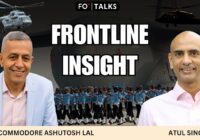Russian military involvement in Syria risks a possible escalation in the four-year old civil conflict.
Since the NATO alliance used United Nations Security Council Resolution 1973 to launch an offensive against Muammar Gaddafi’s regime in 2011 without coordination with Moscow, Russia’s lost political and economic interests in Libya have contributed to the Putin administration’s more assertive policies in Ukraine and Syria.
Recent press reports suggest that the Russian military build-up in Syria includes tens of thousands of regular and irregular troops, 240 tanks and attack aircraft sorties over Idlib province. Since the conflicts in Libya, Ukraine and Syria began—including the Russian annexation of Crimea—US-Russian relations have hit a post-Cold War low.
In this new frosty era, where uncertainty, conflict and a refugee crisis in the Middle East and Europe have led to new international strategic openings for the Kremlin, Soviet strategy is back. Its features include Vladimir Putin’s world outlook, which is far less pro-Western than that of Dmitry Medvedev or Boris Yeltsin before him—they searched for a strategic opening with the US at the detriment of Russian relations with many Middle Eastern and North African states.
Since 2012, when Putin was re-elected president, zero-sum calculations have continued to be made about challenging US hegemonic power in key theaters, stemming NATO interventions and enlargement in its southern neighborhood, and reversing losses Russia experienced in the Middle East since the Arab Spring began. In other words, Russia is attempting to revamp its tried and tested military-to-military relationships with its Soviet-era client states such as Syria, Iraq and Egypt. Its performance in Syria will be noted by these and other states that might already have military ties with the US, but are eager to establish polygamous relations in order to secure maximum autonomy.
Regionally, the Russian calculation appears premised on two recent changes. The first is the P5+1-Iran deal, which has the potential to morph into a broader US-Iranian alliance over time and challenge Russian interests in the Mediterranean and Eurasia. The second is the coordination between the US and Turkey in expanding safe havens on the Syria-Turkey border.
Turkey is also part of an informal regional coalition with Qatar and Saudi Arabia, who support rebel groups in Syria—the only serious threat to Russia’s long-time ally, Syrian President Bashar al-Assad, other than the so-called Islamic State. The difference being that the Islamic State is more likely to be dealt with by a US-led coalition.
Qatar and Saudi Arabia have also been notably hostile to Russia in their media coverage since the Syrian conflict began, while Moscow has concerns about their funding of Islamist causes in the Caucasus. Therefore, the Russian government has little to lose in pursuing an incremental adjustment to its long-standing Syria policy.
Domestically, the European Union and US sanctions regime against the Russian government for its actions in Ukraine, the low international oil price, relatively unproductive Russian labor force and the lack of economic diversification are all increasingly taking their toll on the Russian economy, which entered recession in 2015. The economy cannot, therefore, be discounted as an important driver of foreign military activism.
Another important domestic consideration is Russia’s concern about violent Islamism spilling over from Syria into the southern Caucasus. However, as discussed in my forthcoming book, Muslim Minority – State Relations: Violence, Integration and Policy, the Kremlin’s own policies toward the Caucasus are just as likely to exacerbate the potential for violent jihadi attacks in major Russian cities as any “blowback” (radicalized fighters returning from Syria to carry out attacks in Russia).
Contentious policies include criminalizing certain Muslim communities; replicating a state-controlled muftiate system, which has led to the Muslim elite being focused on securing special financial and political gains from federal and regional authorities; and politicizing spiritual leadership in Chechnya.
Increasing Russian military involvement in Syria certainly risks a possible escalation in the four-year old civil conflict that has both regional and international dimensions. But the move also puts Russia at the center of future diplomacy and a post-conflict solution on Syria.
Peace Deal?
For the Kremlin, that appears to be worthwhile move, but it is unlikely to be the last one. Further strategic calculations cannot be discounted and will continue to trouble Russia’s neighbors and NATO members alike.
However, since Russia, like the United States, does not have a good record in its recent military adventurism, it would be wise to consolidate any gains by securing participation in a robust diplomatic framework on Syria at the earliest opportunity. US Secretary of State John Kerry has also confirmed his country’s interest in securing a diplomatic solution on Syria through a fresh diplomatic push.
With pragmatic cooperation between Russia, the US and third parties occurring as recently as 2012, when there was an alleged Russian proposal for Assad to step down, and in 2013, on the Russian-led chemical weapons deal with the US on Syria, there remains hope for a process that leads up to that eventuality to finally occur.
The views expressed in this article are the author’s own and do not necessarily reflect Fair Observer’s editorial policy.
Photo Credit: Frederic Legrand – COMEO / Shutterstock.com
 We bring you perspectives from around the world. Help us to inform and educate. Your donation is tax-deductible. Join over 400 people to become a donor or you could choose to be a sponsor.
We bring you perspectives from around the world. Help us to inform and educate. Your donation is tax-deductible. Join over 400 people to become a donor or you could choose to be a sponsor.
Support Fair Observer
We rely on your support for our independence, diversity and quality.
For more than 10 years, Fair Observer has been free, fair and independent. No billionaire owns us, no advertisers control us. We are a reader-supported nonprofit. Unlike many other publications, we keep our content free for readers regardless of where they live or whether they can afford to pay. We have no paywalls and no ads.
In the post-truth era of fake news, echo chambers and filter bubbles, we publish a plurality of perspectives from around the world. Anyone can publish with us, but everyone goes through a rigorous editorial process. So, you get fact-checked, well-reasoned content instead of noise.
We publish 2,500+ voices from 90+ countries. We also conduct education and training programs
on subjects ranging from digital media and journalism to writing and critical thinking. This
doesn’t come cheap. Servers, editors, trainers and web developers cost
money.
Please consider supporting us on a regular basis as a recurring donor or a
sustaining member.
Will you support FO’s journalism?
We rely on your support for our independence, diversity and quality.






